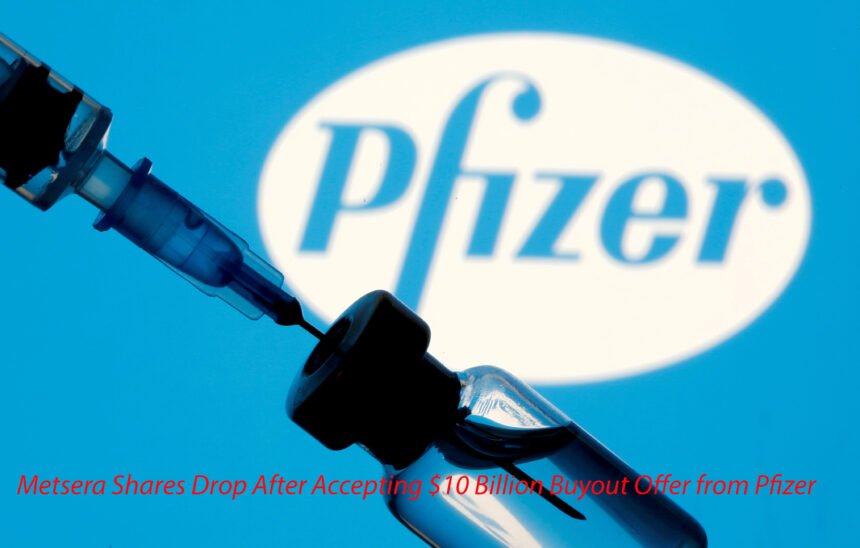Metsera, a biotechnology firm known for its innovative work in metabolic and autoimmune diseases, experienced a sharp drop in its share price after agreeing to a $10 billion acquisition deal with pharmaceutical giant Pfizer. The decision, announced earlier this week, has stirred mixed reactions among investors and analysts who are weighing the long-term implications of the merger for both companies.
The Buyout Deal and Market Reaction
The deal marks one of Pfizer’s biggest acquisitions since its $43 billion purchase of Seagen in 2023. Under the agreement, Pfizer will buy all outstanding shares of Metsera for approximately $92 per share in cash, representing a 17% premium to the company’s last closing price before the announcement. Despite the premium, Metsera’s stock fell nearly 8% after the news broke, signaling investor concerns about the future direction of the company under Pfizer’s control.
Traders reacted to what they viewed as a “sell the news” moment, as the premium offered by Pfizer was smaller than many had anticipated. Some market observers noted that the decline reflects skepticism about the strategic fit between the two firms, as well as fears that Pfizer’s integration process could slow down Metsera’s research progress in key therapeutic areas.
Pfizer’s Strategic Motives
Pfizer has been pursuing aggressive acquisitions to replenish its pipeline after a post-pandemic revenue slump. The company’s COVID-19 vaccine and antiviral sales dropped significantly in 2024, prompting executives to look for new sources of growth. Metsera’s research in metabolic and autoimmune disorders presents a promising opportunity for Pfizer to expand its presence in non-oncology drug development an area where it aims to regain momentum.
Albert Bourla, Pfizer’s CEO, described the acquisition as a step toward “reshaping the company’s portfolio for the next decade.” He emphasized that Metsera’s leading candidate drugs, particularly those targeting chronic inflammation and lipid metabolism, could complement Pfizer’s existing capabilities in immunology and rare diseases.
“Metsera’s innovative science and talented team align perfectly with our long-term strategy to address unmet medical needs,” Bourla stated during a press briefing.
Concerns Over Integration and Innovation
Despite Pfizer’s optimism, industry analysts remain cautious about the merger’s potential impact on Metsera’s innovation-driven culture. Some fear that being absorbed into a large pharmaceutical conglomerate could limit Metsera’s flexibility in decision-making and research prioritization.
Analyst Jason Heller of Morganfield Research commented, “Pfizer has the resources to take Metsera’s programs global, but history shows that acquisitions like this sometimes slow innovation. The challenge will be maintaining Metsera’s nimble, discovery-focused mindset within a corporate framework.”
Others pointed out that Metsera’s key advantage lies in its experimental therapies, still in early-to-mid clinical stages. Pfizer’s involvement could accelerate its development, but regulatory challenges and market competition might delay commercial success.
Broader Implications for the Biotech Sector
The acquisition underscores a broader trend of consolidation in the biotech industry. With rising research costs and funding constraints, smaller biotech firms increasingly rely on buyouts by larger pharmaceutical companies to advance their projects. However, investors often worry that these mergers can lead to short-term financial volatility and reduced innovation across the sector.
For Pfizer, the $10 billion deal represents a calculated risk. The company expects the acquisition to contribute to revenue growth within three to five years, once Metsera drug candidates advance further in clinical trials. Still, the market’s initial reaction suggests that investors are waiting to see how effectively Pfizer can integrate Metsera without diluting its innovative edge.
Looking Ahead
As the acquisition moves through regulatory approval, both companies are preparing for a complex transition period. Pfizer aims to retain most of Metsera’s key researchers and maintain its current R&D operations to minimize disruption. While short-term investor sentiment remains cautious, some analysts believe the deal could pay off over time if Pfizer successfully leverages Metsera’s expertise and accelerates its promising drug pipeline.
For now, however, the market’s verdict is clear: enthusiasm has given way to uncertainty. Metsera’s fall following the buyout announcement reflects the uneasy balance between innovation and consolidation that continues to define the modern pharmaceutical landscape.












